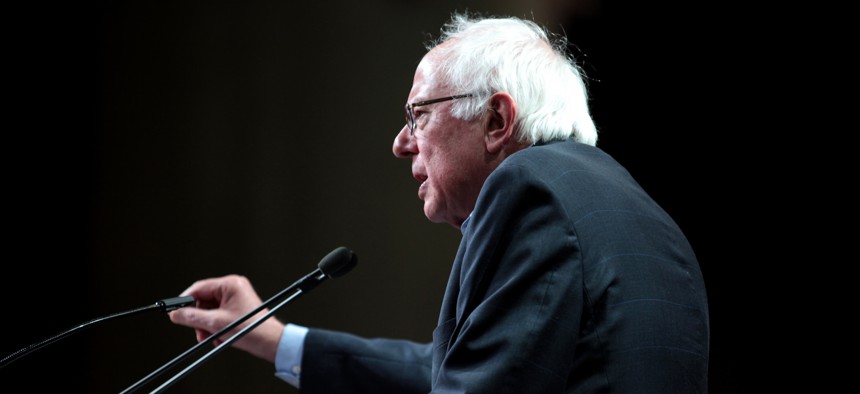
Flickr user Gage Skidmore
Why Bernie Sanders Can't Govern
Hillary Clinton’s realistic attitude is the only thing that can effect change in today’s political climate.
Bernie Sanders and Ted Cruz have something in common. Both have an electoral strategy predicated on the ability of a purist candidate to revolutionize the electorate—bringing droves of chronic non-voters to the polls because at last they have a choice, not an echo—and along the way transforming the political system. Sanders can point to his large crowds and impressive, even astonishing, success at tapping into a small-donor base that exceeds, in breadth and depth, the remarkable one built in 2008 by Barack Obama. Cruz points to his extraordinarily sophisticated voter-identification operation, one that certainly seemed to do the trick in Iowa.
But is there any real evidence that there is a hidden “sleeper cell” of potential voters who are waiting for the signal to emerge and transform the electorate? No. Small-donor contributions are meaningful and a sign of underlying enthusiasm among a slice of the electorate, but they represent a tiny sliver even of that slice; Ron Paul’s success at fundraising (and his big crowds at rallies) misled many analysts into believing that he would make a strong showing in Republican primaries when he ran for president. He flopped.
Is there a huge core of committed ideological conservatives who have not voted before because they had only “moderates” on the ballot? Other than the fact that no objective person could look at the policy positions of John McCain and Mitt Romney as moderate, there is no evidence; the only real parallel to draw on for the theory is Barry Goldwater in 1964. Important as voter identification and get-out-the-vote efforts are, they do not convince chronic non-voters to vote. And, of course, a truly purist ideological campaign would stir a clear counter-reaction on the other side, diluting its impact.
The more important question, in many ways, that flows from this theory is about governing. It is here that the Bernie Sanders approach needs more dissection. Let’s say Sanders is accurate enough that his nomination would lead to his election via a bump in turnout from young voters and other populists disgusted by inequality, the billionaire class privilege and the distorted campaign-money system. Let’s say that he survives the billion dollars that might be spent by the Koch brothers’ alliance, the business community, the Republican candidate, and the Republican Party to destroy him as an unreconstructed socialist who will raise everybody’s taxes.
What then? The odds that a Sanders victory would lead to a Democratic House or a majority of more than one in the Senate are very slim. House districts have grown in partisan tilt; there is no room at all for a Democratic landslide, and not much for significant gains. Democrats have a real chance, if they win the White House, to pick up the four seats needed to recapture a majority, but it would be a very heavy lift to shift that number to seven, eight, or 10. So Sanders, like Obama, would face a divided government. It would be a very different situation than Obama encountered when he first entered the White House, and more like what he faced after the first, disastrous midterm election in 2010. Sanders has made it clear that he would have an extraordinarily ambitious agenda, including Medicare for all, reinstatement of Glass-Steagall, free college for all, and sweeping campaign-finance reform just to start with, along with stiff tax increases to pay for it.
Republicans, no doubt, would have the same approach they had when Obama first got elected in a sweeping party victory, voting as a united parliamentary minority against every presidential initiative. They would offer the same rationale as they did when Obama won reelection while the GOP retained the majority in the House: If he won a mandate, they also won a mandate—and theirs was to block his.
So all of Sanders’s initiatives would start as non-starters. Here, his theory of election and governance comes into play. He would go to the public, a public disgusted with Washington and its corrupt ties to the billionaire class and to business, and force members of Congress to their knees, shifting the debate and the agenda his way.
One of the enduring themes of our democracy is that inscribed in the Capitol, a quote from Alexander Hamilton: “Here, sir, the people govern.” But the notion that public opinion governs the agenda or the actions of Congress is, at best, a stretch. Going over the heads of Congress has long been a staple of frustrated presidents, and it has almost never worked; see Bill Clinton on health care and George W. Bush on Social Security among other recent examples. And these days, with most congressional districts resembling homogeneous echo chambers, created by a combination of people sorting themselves geographically and the distortions of redistricting, national public opinion has limited bearing on congressional leaders. Talk radio, cable news, social media, and blogs mean more. And none of those outlets would be swayed or intimidated to create some huge populist uprising that would force Congress to bring up, much less pass, a sweeping populist agenda. The more Sanders pushed, the more there would be a sharp and vicious counter-reaction that would further tribalize the country.
Sanders as president would be left with two main options: reduce his goals to aim for more incremental progress, or adopt a defensive approach to keep Obama’s policies from being rolled back—exactly what he has condemned in Hillary Clinton’s approach to governance. And while Sanders has been a more effective lawmaker than Cruz (or Rubio, for that matter, as demonstrated by Rick Santorum’s embarrassing failure on Morning Joe to find one accomplishment for his endorsee) there is little evidence that he has or could build the kinds of relationships with other members of Congress, or find ways to move the now humongous boulder up the hill (or Hill) of a thoroughly dysfunctional governing process. And, of course, he would face the deep disappointment of the activists he has inspired.
Could Clinton do better? Yes. First, she has an entirely realistic understanding of where American politics are, something she would carry into the White House on the first day. Progress can be made, on health delivery, financial regulation, the tax system, energy and infrastructure, but it will be a series of incremental steps, a tenth or a quarter of a loaf at a time. Second, in her time in the Senate she showed an impressive ability to build relationships with her Republican colleagues; many of them privately praise her even as they will do their duty and condemn her through the campaign. And she knows enough about the executive branch to use its tools effectively early on to protect the Obama legacy and extend it a bit further. Some progressives, like Bill Press, have expressed disappointment with Obama’s failure to further their agenda; to one who has watched the lawmaking process up close and personal for more than four decades, his ability to move the ball in the face of challenges from his own party and Republicans, and in the face of huge headwinds from the conservative wind machine, has been extraordinarily impressive.
For better or worse—actually, very much for worse—America has a sharply divided and tribalized political system. There will be no sweeping landslide party victories for many years to come; most states, not to mention the overwhelming majority of congressional and state legislative districts, are distinctly red or blue. I would love to get all Americans voting, but there is no reason to believe that moving turnout from 50 or 60 percent to 95 or 98 percent would bring any profound change in policy direction because of a silent supermajority either on the left or the right, or across the populist divide. Presidents almost always face serious constraints on their agendas, with a handful of exceptions built around landslides driven by crises or events. No candidate now running will transform the system in 2016. But some candidates would have an easier time governing through the dysfunction. Ron Brownstein and others have noted that facing that reality could seriously hamper Hillary Clinton in her outreach to voters demanding inspiration, not perspiration. That could well be true. But it also reflects her realistic understanding of the limits of American politics in this unfortunate day and age.
(Image via Flickr user Gage Skidmore)
NEXT STORY: Carly Fiorina Gets Shut Out of Debate







